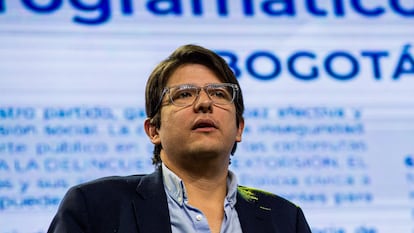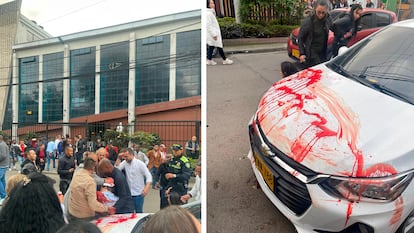The attempted assassination of Colombian politician Miguel Uribe Turbay threatens a return to the violence of the past
The assault on the conservative senator, who was hoping to run for president, is reminiscent of the murders of five presidential candidates between 1986 and 1990


A 39-year-old politician is on the campaign trail. A video shows him addressing his supporters. Suddenly his body convulses. The camera falls, loses focus, people run. It could have been the town of Soacha on August 18, 1989, and the politician could have been Luis Carlos Galán. But it wasn’t. It was Bogotá, on June 7, 2025, and the victim was Miguel Uribe Turbay. On Monday, doctors who performed an emergency surgery on his brain and left leg said that the victim’s condition was very serious. His wife said that he is “fighting for his life.”
The attempt on the life of the conservative Uribe, who hopes to run as presidential candidate in the next elections, has shocked Colombia, which fears that a nightmare from 35 years ago is being revisited: in the presidential campaigns prior to the 1990 elections, not one but three presidential candidates were murdered in a wave of violence that terrorized the country.
The events of June 7 are still not entirely clear. Uribe was campaigning in a middle-class neighborhood of the capital. Several dozen people had attended the rally. The campaign is just beginning: the first round of votes will be on May 31, 2026. No members of the media attended. The two shots were fired by a 15-year-old who was caught after trying to escape on foot, according to the authorities. Uribe meanwhile was taken to hospital. On June 8, the Santa Fe Foundation in Bogotá announced that Uribe Turbay’s condition was so critical he may not survive. Other politicians have condemned the shooting, calling for immediate investigations, and urging national unity.
In August 1989, a seriously wounded Galán did not reach the Kennedy hospital in Bogotá, in time. He was pronounced dead on arrival. Although the elections then were also in the distant future, he was the candidate of what was then the majority political party, the Liberals. He was also a well-known politician. That assassination seemed to echo another one from April 9, 1948, when Jorge Eliécer Gaitán, also a liberal, became the catalyst for enormous violence between political factions. That violence was not repeated after the murder of Galán, but attacks by the drug lords led by Pablo Escobar escalated.

In March 1990, Bernardo Jaramillo, the candidate of the leftist Patriotic Union, was assassinated at Bogotá airport. His predecessor, Jaime Pardo Leal, had already been killed in 1987. Years later, it was established that the paramilitaries were responsible for Jaramillo’s death, rather than Escobar and his associates, or even the FARC guerrillas as some had believed. The following month Carlos Pizarro, who had led the M-19 guerrillas to demobilize, was killed by a suicide hitman who was aware that the candidate’s bodyguards would respond in kind.
These deaths, plus dozens of bombings of civilians, kidnappings and murders, once constituted a nightmare that Colombia could be facing again. In 1989, Galán’s eldest son, the current would-be candidate Juan Manuel, designated César Gaviria as his father’s heir. Antonio Navarro Wolff kept the M-19 under control, replaced Pizarro, and achieved the left’s best result to date. Gaviria won the elections, pushed through a new and more plural Constitution and defeated Escobar, who ended up dead in 1993, but not before kidnapping dozens of people, including Diana Turbay, a renowned journalist and Uribe Turbay’s mother. She died in a rescue attempt when her son was only four years old, the same age as Uribe’s youngest child.
The violence did not end with Escobar’s death. Guerrilla and paramilitary violence only increased in the following two decades. And its consequences are still evident. Drug traffickers still wield tremendous power, armed groups are multiplying, the government and the opposition are accusing each other of violating the Constitution and carrying out a coup, and President Gustavo Petro has even declared Simón Bolívar’s “war to the death.”
The victims of the violence 35 years ago are now at the center of the political tension. The mayor of Bogotá is another son of Galán, Carlos Fernando; and among those running for the nomination on the left is Senator María José Pizarro, daughter of the candidate who was assassinated in 1990. “I am the daughter of a presidential candidate assassinated in 1990 and history cannot be repeated,” she wrote on X in reaction to the attack on Uribe. Colombia has already experienced waves of violence. What happens in the next few hours will indicate if a fresh wave is upon it.
Sign up for our weekly newsletter to get more English-language news coverage from EL PAÍS USA Edition
Tu suscripción se está usando en otro dispositivo
¿Quieres añadir otro usuario a tu suscripción?
Si continúas leyendo en este dispositivo, no se podrá leer en el otro.
FlechaTu suscripción se está usando en otro dispositivo y solo puedes acceder a EL PAÍS desde un dispositivo a la vez.
Si quieres compartir tu cuenta, cambia tu suscripción a la modalidad Premium, así podrás añadir otro usuario. Cada uno accederá con su propia cuenta de email, lo que os permitirá personalizar vuestra experiencia en EL PAÍS.
¿Tienes una suscripción de empresa? Accede aquí para contratar más cuentas.
En el caso de no saber quién está usando tu cuenta, te recomendamos cambiar tu contraseña aquí.
Si decides continuar compartiendo tu cuenta, este mensaje se mostrará en tu dispositivo y en el de la otra persona que está usando tu cuenta de forma indefinida, afectando a tu experiencia de lectura. Puedes consultar aquí los términos y condiciones de la suscripción digital.








































